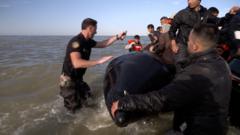French authorities have intensified measures to curb the escalating migrant crisis in the Channel, marking a significant shift in tactics as police launch into the water to disable inflatable boats transporting vulnerable individuals.**
French Police Take Unprecedented Action Against Migrant 'Taxi-Boats' as Crisis Escalates**

French Police Take Unprecedented Action Against Migrant 'Taxi-Boats' as Crisis Escalates**
A rare intervention by French police targets inflatable migrant boats, sparking discussions on new strategies amid soaring Channel crossings.**
French authorities have taken the remarkable step of entering the waters off a beach near Boulogne, employing knives to puncture an inflatable boat that was precariously adrift, packed with migrants, including men, women, and children. This shocking intervention was captured live, showcasing the dramatic moment as those aboard scrambled to escape the boat's progressive collapse.
Under typical protocols, French police are constrained from entering the sea due to the potential risks involved, but pressure to address the rising number of small boat crossings to the UK has led to reassessment of these strict measures. A gendarme, shedding his body armor, initiated the unprecedented action upon recognizing the immediate danger posed to those onboard, highlighting a potential shift in how French authorities may combat smuggling operations.
Government officials in the UK expressed approval of the operation, labeling it a "significant moment" in the effort to tackle illegal migration. The spokesperson emphasized a desire for intensified action, stemming from cooperative efforts between the UK and France.
This occurrence signifies a potential turning point in response strategies. Previously, the focus has been primarily on implementing more patrols at sea designed to intercept smuggling boats preemptively, rather than reactive measures at shorelines. Sources suggest procedural changes could prioritize maritime surveillance over beach interventions.
As chaos unfolded offshore, crowds of people donned in life jackets rushed from the dunes toward the water, eager to board the waiting taxi-boats. Observers noted a significant surge in migrant activity, with groups as large as 100 attempting the perilous crossings.
The situation turned critical as the inflatable boat lost power, eliciting terrifying screams from children aboard. Although initially hesitant, the police decided to step in as conditions became increasingly unsafe, signaling a new level of urgency in addressing these maritime crises.
As officers took action to disable the boat, voices of outrage arose from the migrants, some expressing despair and fear. Their belongings were left scattered as they were escorted away from the shoreline towards a bus ride back to camps further north.
This event raises critical questions about the effectiveness and ethics of current intervention strategies in the ongoing migrant crisis, posing challenges to both French and UK authorities as they navigate this complex humanitarian issue.


















